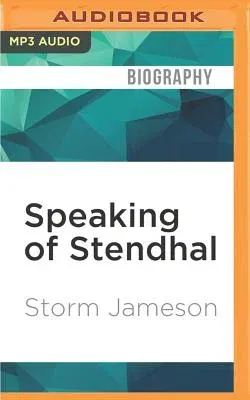Storm Jameson writes of Stendhal 'as one speaks in suitable company of a
friend'. She knew him very well. Over the years she read everything
available by him and she immersed herself in his life and his writings -
and the two cannot be separated. As a biographical subject, Stendhal is
vastly more rewarding than many literary figures. Something was forever
happening to him; usually another passionate love affair. Life at home,
in his youth, was a smouldering battle-ground: he hated his father, and
when he rejoiced at the execution of Louis XVI, 'be sure', Storm Jameson
adds, 'that another head glimmered in his mind.' There was his naively
close relationship with his sister Pauline, whom however he later
outgrew, so that 'he would do anything he could for her except live with
her.' There was his brief but horrifying experience of Napoleon's wars.
And of course, there was his passion for travel, for society, for the
opera, for Italy. It all became part of the texture of his books. What
is so astonishing is that his contemporaries were unconscious of his
genius: even his old friend Merimee patronised him as a failure.
Posterity has set that right, and this study, so lucidly and
perceptively written, and providing so many insights, gives a
marvellously concise picture of a rich and varied life.
Storm Jameson (1891- 1986) born to a North Yorkshire family of
shipbuilders. Jameson's fiery mother, who bore three girls, encouraged
Storm (christened Margaret Storm) to pursue an academic education. After
being taught privately and at Scarborough municipal school she won one
of three county scholarships which enabled her to read English
Literature at Leeds University. She then went on to complete an MA in
European Drama at King's College London. During her career Jameson wrote
45 novels, numerous pamphlets, essays, and reviews, in an effort to make
money. Her personal life suffered, and her first marriage to
schoolmaster Charles Douglas Clarke was an unhappy one. After they
divorced in 1925, Jameson went on to marry Guy Chapman, a fellow author,
and remained with him despite her apparent rejection of normal domestic
life. Storm Jameson was always politically active, helping to publish a
Marxist journal in the British section of the International Union of
Revolutionary Writers in 1934 and attending anti-fascist rallies.

